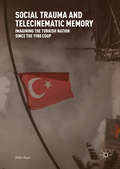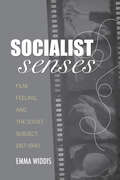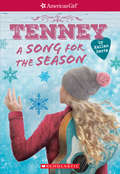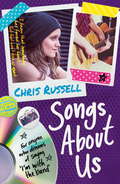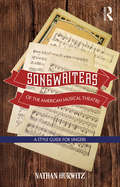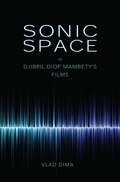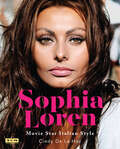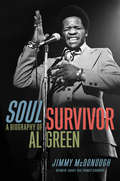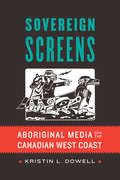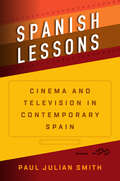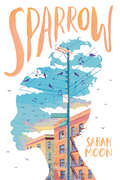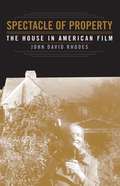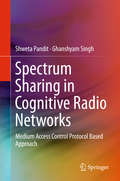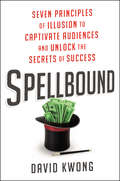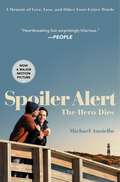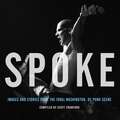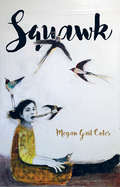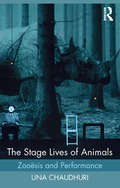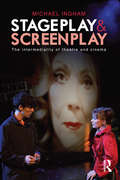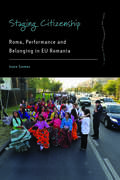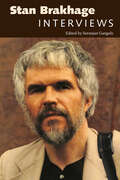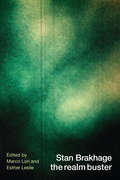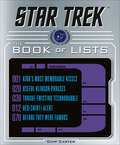- Table View
- List View
Social Trauma and Telecinematic Memory
by Pelin BaşcıThis book explores responses to authoritarianism in Turkish society through popular culture by examining feature films and television serials produced between 1980 and 2010 about the 1980 coup. Envisioned as an interdisciplinary study in cultural studies rather than a disciplinary work on cinema, the book advocates for an understanding of popular culture in discerning emerging narratives of nationhood. Through feature films and television serials directly dealing with the coup of 1980, the book exposes tropes and discursive continuities such as "childhood" and "the child". It argues that these conventional tropes enable popular debates on the modern nation's history and its myths of identity.
Socialist Senses: Film, Feeling, and the Soviet Subject, 1917–1940
by Emma WiddisThis major reimagining of the history of Soviet film and its cultural impact explores the fundamental transformations in how film, through the senses, remade the Soviet self in the 1920s and 1930s. Following the Russian Revolution, there was a shared ambition for a 'sensory revolution' to accompany political and social change: Soviet men and women were to be reborn into a revitalized relationship with the material world. Cinema was seen as a privileged site for the creation of this sensory revolution: film could both discover the world anew, and model a way of inhabiting it. Drawing upon an extraordinary array of films, noted scholar Emma Widdis shows how Soviet cinema, as it evolved from the revolutionary avant-garde to Socialist Realism, gradually shifted its materialist agenda from emphasizing the external senses to instilling the appropriate internal senses (consciousness, emotions) in the new Soviet subject.
A Song for the Season (American Girl: Tenney Grant #4)
by Kellen HertzBuckle your seatbelts--In this fourth book in the series, Tenney & Logan are taking their show on the road! Christmas is just around the corner, and Tenney can't wait to share their music with fans all over Tennessee. But being on the road is harder than she expected--she's missing out on her favorite holiday traditions at home. . . and why is Logan being such a scrooge? After a series of disappointments, the duo begins to crack under pressure. Can they save the tour--and their holiday spirit--in time for Christmas?
Songs About a Girl: Book 2 in a trilogy about love, music and fame (Songs About a Girl #2)
by Chris RussellHeartbreak, romance, fame and pop music - for anyone who's ever dreamed of saying 'I'm with the band'. From a Zoella Book Club friend.Two months on from the explosive finale to book one, Charlie's life is almost back to normal again: rebuilding her relationship with her father, hanging out with best mate Melissa, and worrying about GCSEs. All the while, Gabe's revelations about her mother are never far from her mind. And neither is Gabe.It's not long before Charlie is pulled back into the world of Fire&Lights - but the band seem different this time. But then again, so is she...Meanwhile, tensions between Gabe and Olly continue to run high, leading to more turmoil between the band members and press than ever before. But when Gabriel and Charlie stumble upon yet another startling truth that links them together - everything they have stands to implode in front of them.'A thoroughly absorbing tale of family relationships, friendship and betrayal. Fans of Non Pratt will love it' School Librarian
Songs About a Girl: Book 2 in a trilogy about love, music and fame
by Chris RussellHeartbreak, romance, fame and pop music - for anyone who's ever dreamed of saying 'I'm with the band'. From a Zoella Book Club friend.Two months on from the explosive finale to book one, Charlie's life is almost back to normal again: rebuilding her relationship with her father, hanging out with best mate Melissa, and worrying about GCSEs. All the while, Gabe's revelations about her mother are never far from her mind. And neither is Gabe.It's not long before Charlie is pulled back into the world of Fire&Lights - but the band seem different this time. But then again, so is she...Meanwhile, tensions between Gabe and Olly continue to run high, leading to more turmoil between the band members and press than ever before. But when Gabriel and Charlie stumble upon yet another startling truth that links them together - everything they have stands to implode in front of them.'A thoroughly absorbing tale of family relationships, friendship and betrayal. Fans of Non Pratt will love it' School Librarian
Songwriters of the American Musical Theatre: A Style Guide for Singers
by Nathan HurwitzFrom the favorites of Tin Pan Alley to today’s international blockbusters, the stylistic range required of a musical theatre performer is expansive. Musical theatre roles require the ability to adapt to a panoply of characters and vocal styles. By breaking down these styles and exploring the output of the great composers, Songwriters of the American Musical Theatre offers singers and performers an essential guide to the modern musical. Composers from Gilbert and Sullivan and Irving Berlin to Alain Boublil and Andrew Lloyd Webber are examined through a brief biography, a stylistic overview, and a comprehensive song list with notes on suitable voice types and further reading. This volume runs the gamut of modern musical theatre, from English light opera through the American Golden Age, up to the "mega musicals" of the late Twentieth Century, giving today’s students and performers an indispensable survey of their craft.
Sonic Space in Djibril Diop Mambety's Films
by Vlad DimaThe art of Senegalese director Djibril Diop Mambety's cinema lies in the tension created between the visual narrative and the aural narrative. His work has been considered hugely influential, and his films bridge Western practices of filmmaking and oral traditions from West Africa. Mambety's film Touki Bouki is considered one of the foundational works of African cinema. Vlad Dima proposes a new reading of Mambety's entire filmography from the perspective of sound. Following recent analytical patterns in film studies that challenge the primacy of the visual, Dima claims that Mambety uses voices, noise, and silence as narrative tools that generate their own stories and sonic spaces. By turning an ear to cinema, Dima pushes African aesthetics to the foreground of artistic creativity and focuses on the critical importance of sound in world cinema.
Sophia Loren: Movie Star Italian Style (Turner Classic Movies)
by Cindy De La HozThe first book on Sophia of its kind, Sophia Loren: Movie Star Italian Style is a photographic tribute to the beloved icon, recounting the star's extraordinary life and notable films.From the humblest of beginnings in her native Italy, Sophia Loren has gone on to have one of the most interesting paths in motion picture history. In a career spanning close to seven decades, she starred in epic blockbusters of the '50s, '60s, and '70s; dazzled in dramatic roles opposite the likes of Cary Grant, Marcello Mastroianni, John Wayne, Gregory Peck, and Marlon Brando; and turned heads in classics like Houseboat, Marriage Italian Style, Grumpy Old Men, and Two Women, for which she was awarded the first Academy Award for Best Actress in a leading role given to the star of a foreign film.Sophia Loren is a photographic tribute to the beloved icon, taking you on an illustrative journey through her remarkable life, dearest relationships, and diverse film canon. Filled with hundreds of rare color and black-and-white photographs and featuring quotes by Sophia and those who have known her best, it's a volume as stunning as its ageless subject.
Soul Survivor: A Biography of Al Green
by Jimmy McdonoughThe bestselling author of Shakey: Neil Young's Biography presents the first in-depth biography of the legendary soul singer Al Green.Al Green has blessed listeners with some of the biggest hits of the past fifty years. "Love and Happiness," "I'm Still in Love with You," "Let's Get Married," and "I'm Tired of Being Alone" are but a sampling of the iconic songs that led a generation to embrace love in perhaps the most tumultuous period in this country's history, an unparalleled body of work that has many calling Green one of the greatest soul singers of all time. The music legend has sold over 20 million albums and been sampled by numerous rappers, and even President Obama has been known to sing a chorus or two. The now-Bishop Green is without a doubt one of the most beloved yet inscrutable figures ever to grace the popular music stage, and he has managed to magically sidestep being successfully scrutinized in print. Until now.Acclaimed journalist and author Jimmy McDonough expertly tackles this most elusive of subjects and aims to present readers with the definitive portrait of a man everyone knows but few understand. McDonough manages to break through Green's joyous veneer to reveal the contrary, tortured, and solitary individual beneath, a man who spent decades dancing an uneasy tightrope between the sacred and the profane. From his childhood in the backwaters of Arkansas to commanding the stage in front of throngs of lusting fans to addressing a very different audience from the pulpit of his own church, readers will bear witness to the creation of some of the most electrifying soul music ever recorded; learn the hitherto untold real story behind Green's colorful down-home Memphis label, Hi Records; and--by way of countless in-depth interviews with major players in the story, some speaking for the very first time--unravel one of the last great mysteries in popular music: Al Green.
Sovereign Screens: Aboriginal Media on the Canadian West Coast
by Kristin L. DowellWhile Indigenous media have gained increasing prominence around the world, the vibrant Aboriginal media world on the Canadian West Coast has received little scholarly attention. As the first ethnography of the Aboriginal media community in Vancouver, Sovereign Screens reveals the various social forces shaping Aboriginal media production including community media organizations and avant-garde art centers, as well as the national spaces of cultural policy and media institutions.Kristin L. Dowell uses the concept of visual sovereignty to examine the practices, forms, and meanings through which Aboriginal filmmakers tell their individual stories and those of their Aboriginal nations and the intertribal urban communities in which they work. She explores the ongoing debates within the community about what constitutes Aboriginal media, how this work intervenes in the national Canadian mediascape, and how filmmakers use technology in a wide range of genres—including experimental media—to recuperate cultural traditions and reimagine Aboriginal kinship and sociality. Analyzing the interactive relations between this social community and the media forms it produces, Sovereign Screens offers new insights into the on-screen and off-screen impacts of Aboriginal media.
Spanish Lessons: Cinema and Television in Contemporary Spain
by Paul Julian SmithThough unjustly neglected by English-language audiences, Spanish film and television not only represent a remarkably influential and vibrant cultural industry; they are also a fertile site of innovation in the production of "transmedia" works that bridge narrative forms. In Spanish Lessons, Paul Julian Smith provides an engaging exploration of visual culture in an era of collapsing genre boundaries, accelerating technological change, and political-economic tumult. Whether generating new insights into the work of key figures like Pedro Almodóvar, comparing media depictions of Spain's economic woes, or giving long-overdue critical attention to quality television series, Smith's book is a consistently lively and accessible cultural investigation.
Sparrow (Arthur A Levine Novel Bks.)
by Sarah MoonThe story of a sensitive, gifted African American girl who tells us with mordant humor what it feels like to spend every day wishing so hard that you could fly away from it allSparrow has always had a difficult time making friends. She would always rather stay home on the weekends with her mother, an affluent IT executive at a Manhattan bank, reading, or watching the birds, than play with other kids. And that's made school a lonely experience for her. It's made LIFE a lonely experience.But when the one teacher who really understood her -- Mrs. Wexler, the school librarian, a woman who let her eat her lunch in the library office rather than hide in a bathroom stall, a woman who shared her passion for novels and knew just the ones she'd love -- is killed in a freak car accident, Sparrow's world unravels and she's found on the roof of her school in an apparent suicide attempt.With the help of an insightful therapist, Sparrow finally reveals the truth of her inner life. And it's here that she discovers an outlet in rock & roll music...
Spectacle of Property: The House in American Film
by John David RhodesMuch of our time at the movies is spent in other people’s homes. Cinema is, after all, often about everyday life. Spectacle of Property is the first book to address the question of the ubiquitous conjuncture of the moving image and its domestic architecture. Arguing that in cinema we pay to occupy spaces we cannot occupy, John David Rhodes explores how the house in cinema both structures and criticizes fantasies of property and ownership.Rhodes tells the story of the ambivalent but powerful pleasure we take in looking at private property onscreen, analyzing the security and ease the house promises along with the horrible anxieties it produces. He begins by laying out a theory of film spectatorship that proposes the concept of the “spectator-tenant,” with reference to films such as Gone with the Wind and The Magnificent Ambersons. The book continues with three chapters that are each occupied with a different architectural style and the films that make use of it: the bungalow, the modernist house, and the shingle style house. Rhodes considers a variety of canonical films rarely analyzed side by side, such as Psycho in relation to Grey Gardens and Meet Me in St. Louis. Among the other films discussed are Meshes of the Afternoon, Mildred Pierce, A Star Is Born, Killer of Sheep, and A Single Man.Bringing together film history, film theory, and architectural history as no book has to date, Spectacle of Property marks a new milestone in examining cinema’s relationship to realism while leaving us vastly more informed about, if less at home inside, the houses we occupy at the movies.
Spectrum Sharing in Cognitive Radio Networks
by Shweta Pandit Ghanshyam SinghThis book discusses the use of the spectrum sharing techniques in cognitive radio technology, in order to address the problem of spectrum scarcity for future wireless communications. The authors describe a cognitive radio medium access control (MAC) protocol, with which throughput maximization has been achieved. The discussion also includes use of this MAC protocol for imperfect sensing scenarios and its effect on the performance of cognitive radio systems. The authors also discuss how energy efficiency has been maximized in this system, by applying a simple algorithm for optimizing the transmit power of the cognitive user. The study about the channel fading in the cognitive user and licensed user and power adaption policy in this scenario under peak transmit power and interference power constraint is also present in this book.
Spellbound: Seven Principles of Illusion to Captivate Audiences and Unlock the Secrets of Success
by David KwongA professional magician and illusionist—the head magic consultant for the hit film Now You See Me—reveals how to bridge the gap between perception and reality to increase your powers of persuasion and influence.David Kwong has astounded corporate CEOs, TED talk audiences, and thousands of other hyper-rational people, making them see, believe, and even remember what he wants them to. Illusion is an ancient art that centers on control: commanding a room, building anticipation, and appearing to work wonders. Illusion works because the human brain is wired to fill the gap between seeing and believing. Successful leaders—like Steve Jobs, Warren Buffett, and Ted Turner—are masters of control and command who understand how to sway opinions and achieve goals.In his years of research and practice, David has discovered seven fundamental principles of illusion. With these rules anyone can learn to:Mind the Gap—recognize and employ the perceptual space between your audience’s ability to see and their impulse to believe.Load Up—prepare to amaze your audience.Write the Script—discover the importance of shaping the narrative that surrounds your illusion.Control the Frame—explore the real life value of a magician’s best friend: misdirection.Design Free Choice—command your audience by giving them agency.Employ the Familiar—take secret advantage of habits, patterns, and audience expectations.Conjure an Out—develop backup plans that will keep you one, two, three, or more steps ahead of the competition.With Spellbound you’ll discover a different way to sell your idea, product, or skills, and make your best shot better than everyone else’s.
Spoiler Alert: A Memoir of Love, Loss, and Other Four-Letter Words
by Michael AusielloIn this evocative and gorgeously wrought memoir reminiscent of Rob Sheffield’s Love Is a Mixtape and George Hodgman’s Bettyville, Michael Ausiello—a respected TV columnist and founder and editor-in-chief of TVLine.com—remembers his late husband, and the lessons, love, and laughter that they shared throughout their fourteen years together.For the past decade, TV fans of all stripes have counted upon Michael Ausiello’s insider knowledge to get the scoop on their favorite shows and stars. From his time at Soaps in Depth to his influential stints at TV Guide and Entertainment Weekly to his current role as founder and editor-in-chief of the wildly popular website TVLine.com, Michael has established himself as the go-to expert when it comes to our most popular form of entertainment. What many of his fans don’t know, however, is that while his professional life was in full swing, Michael had to endure the greatest of personal tragedies: his husband, Kit Cowan, was diagnosed with a rare and very aggressive form of neuroendocrine cancer. Over the course of eleven months, Kit and Michael did their best to combat the deadly disease, but Kit succumbed to his illness in February 2015. In this heartbreaking and darkly hilarious memoir, Michael tells the story of his harrowing and challenging last year with Kit while revisiting the thirteen years that preceded it, and how the undeniably powerful bond between him and Kit carried them through all manner of difficulty—always with laughter front and center in their relationship. Instead of a tale of sadness and loss, Spoiler Alert: The Hero Dies is an unforgettable, inspiring, and beautiful testament to the resilience and strength of true love.
Spoke: Images and Stories from the 1980s Washington, DC Punk Scene
by Scott Crawford"The pictures, which include some posed portraits but are mostly concert shots, are the chief attraction. They freeze moments of adolescent release, vein-bulging intensity and sweaty communion that fuses performer and audience...Vivid and evocative."--Washington Post"Scott Crawford, the man behind the acclaimed documentary Salad Days, has given us another taste of the best-kept secret of 80s in his new book Spoke: Washington DC’s hardcore punk scene."--Dazed"With music by Minor Threat, Void, Rites of Spring, Government Issue, and many others propelling the story of hardscrabble, Reagan-era D.C. as the hotbed for a new artistic outlet in Salad Days, Crawford saw the book as a way to scoop up important narrative from the cutting-room floor and find a new home for it."--Fast Company"Pockmarked with burned-out buildings and boarded-over storefronts, Northwest DC was once home to a vibrant and sometimes violent punk movement beginning in the early 1980s. For geeky 12-year-old Scott Crawford, that changed everything: He chucked comic books for punk rock and self-published a music zine from his mother’s kitchen table in Silver Spring. This month, Crawford releases a book about those days, Spoke--a companion to his 2014 documentary, Salad Days--featuring stories from local players such as Dave Grohl, Henry Rollins, and Ian MacKaye."--Washingtonian Magazine"Spoke...adroitly uses both photographs and oral histories to capture the importance of what can best be described as a cultural revolution within the nation’s capital."--Shepherd Express"This coffee table version of the documentary [Salad Days] follows the D.C. scene’s often politically-charged brand of punk rock, from Bad Brains to Jawbox, and of course the legendary Fugazi. And there’s even the near-forgotten SOA, whose frontman Henry Rollins took his D.C. energy to L.A. where he stepped in as the singer for Black Flag."--Yellow Scene Magazine"A must-have for any rock historian or pop-culture buff...The perfect punk coffee table book."--Shockwave Magazine"Highly recommended...A must read for punk fans."--Chorus.fm/HiFiNoise"A worthy addition to the growing amount of literature on the American hardcore/punk scene, Spoke will look great on any aging punks’ coffee table as a document to a vital, electric time."--Ink19.com"A forthright testament to a kaleidoscopic community. This is a rounded collection, with surprises on every page...It’s collection that rocks."--Shelf Awareness for ReadersThe Washington, DC punk music scene of the 1980s gave birth to influential bands like Bad Brains, Minor Threat, and Fugazi. Here that era is portrayed in its purest form: an oral history by the creators themselves, including nearly two hundred photographs capturing the power and spirit of this politically progressive corner of American underground music. This stunning and intimate collection features rare images from Jim Saah, Cynthia Connolly, Bert Queiroz, and many others who documented this vibrant community. Compiled by Scott Crawford-whose critically acclaimed film Salad Days provided an unprecedented exploration into the 1980s DC punk scene-Spoke delves deeper into one of the most dynamic movements in US music history.Featuring: BAD BRAINS, THE TEEN IDLES, BLACK MARKET BABY, SOA, MINOR THREAT, GOVERNMENT ISSUE, VOID, IRON CROSS, THE FAITH, SCREAM, MARGINAL MAN, GRAY MATTER, BEEFEATER, KING FACE, RITES OF SPRING, DAG NASTY, EMBRACE, SOULSIDE, FIRE PARTY, SHUDDER TO THINK, IGNITION, FUGAZI, SWIZ, THE NATION OF ULYSSES, and JAWBOX.
Squawk
by Megan Gail ColesAnnie Runningbird doesn’t have time for the games boys want her to play. She’s aging out of foster care on her next birthday. The system has decided she is an adult, so Annie must make adult decisions. Where will she live? How will she make money? Demanding grown-up choices preoccupy the young girl’s mind as she navigates relationships with boys and men in her company. Does she like Isaac, a cute yet naive boy she met at the mall food court? Can she trust Louis, her older and increasingly overbearing foster care worker? Who can Annie depend on in her ever-shifting world? This intel is important. Because Annie needs to win the very real game she’s playing. She must save herself to save the day.
The Stage Lives of Animals: Zooesis and Performance (Routledge Studies in Theatre, Ecology, and Performance)
by Una ChaudhuriThe Stage Lives of Animals examines what it might mean to make theatre beyond the human. In this stunning collection of essays, Una Chaudhuri engages with the alternative modes of thinking, feeling, and making art offered by animals and animality, bringing insights from theatre practice and theory to animal studies as well as exploring what animal studies can bring to the study of theatre and performance. As our planet lives through what scientists call "the sixth extinction," and we become ever more aware of our relationships to other species, Chaudhuri takes a highly original look at the "animal imagination" of well-known plays, performances and creative projects, including works by: Caryl Churchill Rachel Rosenthal Marina Zurkow Edward Albee Tennesee Williams Eugene Ionesco Covering over a decade of explorations, a wide range of writers, and many urgent topics, this volume demonstrates that an interspecies imagination deeply structures modern western drama.
Stage-Play and Screen-Play: The intermediality of theatre and cinema
by Michael InghamDialogue between film and theatre studies is frequently hampered by the lack of a shared vocabulary. Stage-Play and Screen-Play sets out to remedy this, mapping out an intermedial space in which both film and theatre might be examined. Each chapter’s evaluation of the processes and products of stage-to-screen and screen-to-stage transfer is grounded in relevant, applied contexts. Michael Ingham draws upon the growing field of adaptation studies to present case studies ranging from Martin McDonagh’s The Cripple of Inishmaan and RSC Live’s simulcast of Richard II to F.W. Murnau’s silent Tartüff, Peter Bogdanovich’s film adaptation of Michael Frayn’s Noises Off, and Akiro Kurosawa’s Ran, highlighting the multiple interfaces between media. Offering a fresh insight into the ways in which film and theatre communicate dramatic performances, this volume is a must-read for students and scholars of stage and screen.
Staging Citizenship: Roma, Performance and Belonging in EU Romania (Dance and Performance Studies #11)
by Ioana SzemanBased on over a decade of fieldwork conducted with urban Roma, Staging Citizenship offers a powerful new perspective on one of the European Union’s most marginal and disenfranchised communities. Focusing on “performance” broadly conceived, it follows members of a squatter’s settlement in Transylvania as they navigate precarious circumstances in a postsocialist state. Through accounts of music and dance performances, media representations, activism, and interactions with both non-governmental organizations and state agencies, author Ioana Szeman grounds broad themes of political economy, citizenship, resistance, and neoliberalism in her subjects’ remarkably varied lives and experiences.
Stan Brakhage: Interviews (Conversations with Filmmakers Series)
by Suranjan GangulyIn this volume, editor Suranjan Ganguly collects nine of Stan Brakhage’s most important interviews in which the filmmaker describes his conceptual frameworks; his theories of vision and sound; the importance of poetry, music, and the visual arts in relation to his work; his concept of the muse; and the key influences on his art-making. In doing so, Brakhage (1933–2003) discusses some of his iconic films, such as Anticipation of the Night, Dog Star Man, Scenes from Under Childhood, Mothlight, and The Text of Light.One of the most innovative filmmakers in the history of experimental cinema, Brakhage made almost 350 films in his fifty-two-year-long career. These films include psychodramas, autobiography, Freudian trance films, birth films, song cycles, meditations on light, and hand-painted films, which range from nine seconds to over four hours in duration. Born in Kansas City, Missouri, he lived most of his life in the mountains of Colorado, teaching for twenty-one years in the film studies program at the University of Colorado, Boulder.As a filmmaker, Brakhage’s life-long obsession with what he called an “adventure in perception” made him focus on the act of seeing itself, which he tried to capture on film in multiple ways both with and without his camera and by scratching and painting on film. Convinced that there is a primary level of cognition that precedes language, he wrote of the “untutored eye” with which children can access ineffable visual realities. Adults, who have lost such primal sight, can “retrain” their eyes by becoming conscious of what constitutes true vision and the different ways in which they daily perceive the world. Brakhage’s films experiment with such perceptions, manipulating visual and auditory experience in ways that continue to influence film today.
Stan Brakhage the realm buster
by Edited by Marco Lori and Esther LeslieStan Brakhage’s body of work counts as one of the most important within post-war avant-garde cinema, and yet it has rarely been given the attention it deserves. Over the years, though, diverse and original reflections have developed, distancing his figure little by little from critical categories. This collection of newly commissioned essays, plus some important reprinted work, queries some of the consensus on Brakhage’s films. In particular, many of these essays revolve around the controversial issues of representation and perception.This project sets out from the assumption that Brakhage’s art is articulated primarily through opposing tensions, which donate his figure and films an extraordinary depth, even as they evince fleetingness, elusivity and paradoxicality. This collection aims not only to clarify aspects of Brakhage’s art, but also to show how his work is involved in a constant mediation between antinomies and opposites. At the same time, his art presents a multifaceted object endlessly posing new questions to the viewer, for which no point of entry or perspective is preferred in respect to the others. Acknowledging this, this volume hopes that the experience of his films will be revitalised.Featuring topics as diverse as the technical and semantic ambiguity of blacks, the fissures in mimetic representation of the ‘it’ within the ‘itself’ of an image, the film-maker as practical psychologist through cognitive theories, the critique of ocularcentrism by mingling sight with other senses such as touch, films that can actually philosophise in a Wittgensteinian way, political guilt and collusion in aesthetic forms, a disjunctive, reflexive, and phenomenological temporality realising Deleuze’s image-time, and the echoes of Ezra Pound and pneumophantasmology in the quest of art as spiritual revelation; this book addresses not only scholars, but also is a thorough and thought-provoking introduction for the uninitiated. Contributors include:
Standing Strong
by Teresa GiudiceThe Real Housewives of New Jersey star and New York Times bestselling author Teresa Giudice opens up about her tumultuous past year in her emotional new memoir Standing Strong.In her second memoir, Teresa chronicles her life since her release from prison and what it’s been like to weather difficult times as a single mother. Though she recounts the happy memories she has experienced over the past year, she also touches upon some of the darkest times of her life, including her parents' hospitalizations for severe medical issues in late 2016, which led to the tragic passing of her mother in March of 2017. With unparalleled honesty and courage, Teresa opens up in Standing Strong in ways she never has before, showing her fans what it truly means to be a survivor.
Star Trek: The Book of Lists
by Chip CarterSpanning the epic science fiction franchise’s fifty-one-year history, a breathtaking collection of the most compelling Star Trek facts and trivia, including events from both on and off-screen, available in 100 concise lists.Since Gene Roddenberry’s original series first aired in 1966, Star Trek has become a pop culture phenomenon, and one of the largest global properties of all time. Entertaining and fun, Star Trek: The Book of Lists catalogs the most compelling facts about the original series and its spin-offs, as well as its thirteen films, gathered together and broken down into one hundred lists, including:Historical Figure CameosCrew CrossoversMemorable DeathsIntergalactic Threats, Enemies, and VillainsCompiling a galaxy's worth of information in one handy digest, Star Trek: The Book of Lists is a fascinating historical record of the Star Trek universe for both hardcore fans and causal viewers.
